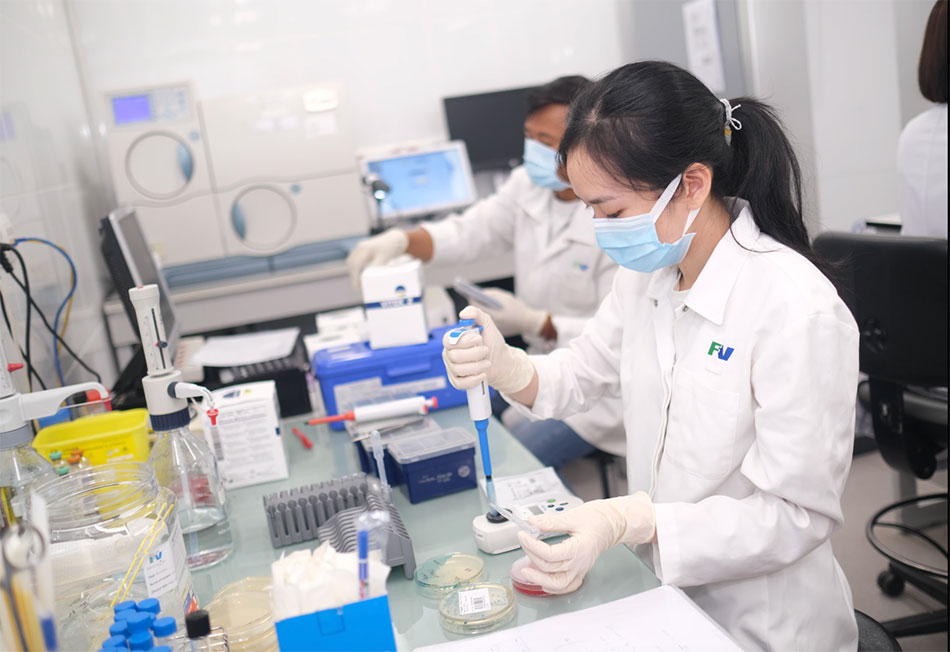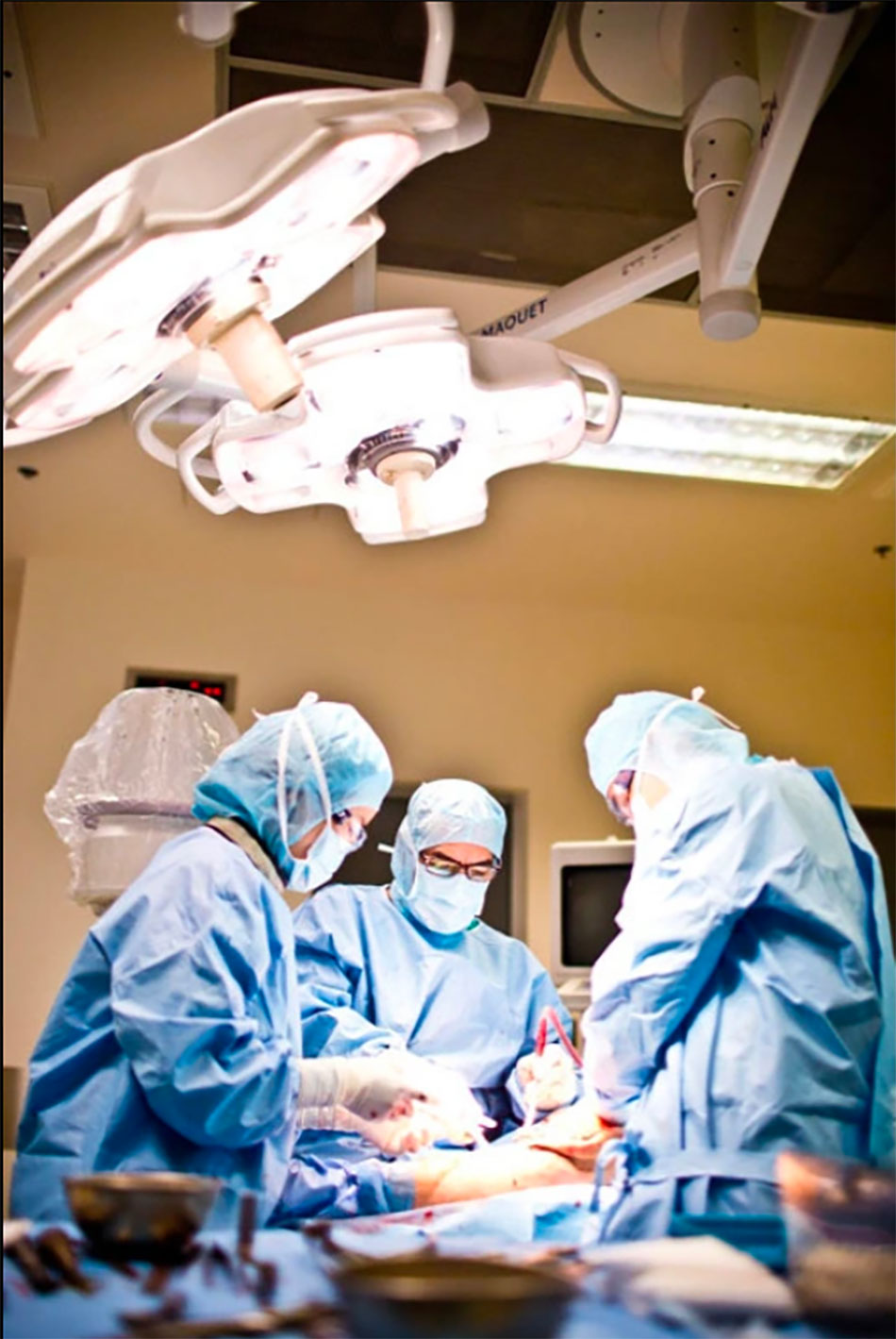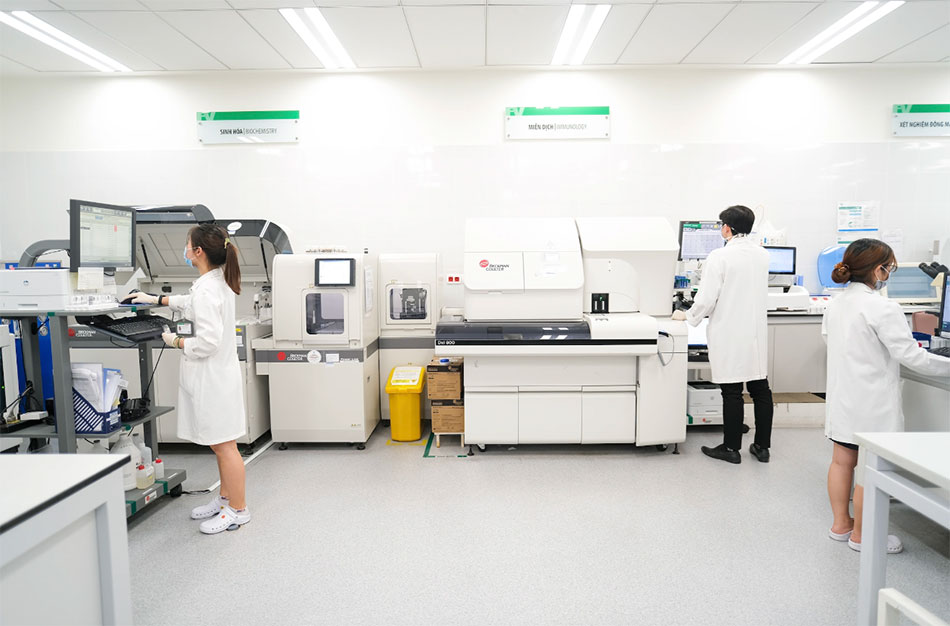In cases of minor injuries like insect bites or superficial skin scratches, individuals with underlying conditions such as diabetes, liver disease, and kidney disease, can be at risk of severe infection, organ failure, and even death if issues are not treated promptly.
An insect bite almost leads to the amputation of a limb
During a visit to his hometown in Ben Tre in June 2023, 54-year-old Mr P.N.N., an overseas Vietnamese with a history of diabetes, was bitten by an insect on his left ankle. The bite initially didn’t seem serious; however, during a rainy outing, the wound came into contact with floodwater, resulting in swelling and inflammation.
Within four days, the swelling spread from his left ankle to the calf, then up to the knee, and eventually reached his left thigh and groin area. Mr N. was urgently admitted to FV Hospital for treatment.

Doctors conduct antibiotic susceptibility testing to identify the bacteria present.
“When the patient arrived at the hospital, he showed signs of shock, including rapid pulse, low blood pressure, and rapid breathing, so he was immediately transferred to the Intensive Care Unit (ICU). Simultaneously, information about the case was rapidly relayed to specialist departments, including the Infectious Diseases Department and Bone and Joint Centre, for accurate, timely intervention,” said Duong Bich Thuy, MD, PhD, an Infectious Diseases specialist.
“Upon reviewing the patient’s condition, I suspected it was a case of toxic shock and proposed the use of toxin-covering antibiotics.”
One day after hospital admission, the Laboratory & Blood Bank Department reported that Mr N.’s wound culture showed two types of bacteria: Streptococcus pyogenes and Stenotrophomonas maltophilia. Of the two, Streptococcus pyogenes is a dangerous bacterium capable of releasing toxins into the blood, causing toxic shock, which had been initially recognised by FV doctors.
Dr Thuy explained that this is dangerous and life-threatening condition and has a high mortality rate of up to 70 per cent. In Mr N.’s case, toxic shock syndrome had led to necrotising fasciitis in his left calf, and kidney failure. Without prompt diagnosis and treatment, Mr N. might have faced limb amputation as the last resort to save his life. According to global medical literature, necrotising fasciitis of the lower limb is the most common cause of limb loss.
A multidisciplinary consultation involving surgeons, anaesthesiologists, and infectious disease specialists was quickly convened, and they unanimously decided to perform surgical debridement of the necrotic tissue in the left leg. Simultaneously, appropriate antibiotics were administered, which both targeted the bacteria and neutralised the toxins released by them. The patient also received aggressive intensive care treatment in the hope of preserving his life and minimising the risk of limb loss.”

Mr N. had to undergo three surgeries so that doctors could cut away the necrotic tissue while conserving healthy tissue.
Dr Truong Hoang Vinh Khiem, Specialist Level I, Bone & Joint Centre, along with the surgical team, promptly operated. Mr N. received three surgeries to debride the necrotic tissue in his leg, each conducted meticulously and with great care to maximise tissue preservation while removing all necrotic tissue.
After three weeks of infection treatment and intensive postoperative care, the wound had healed properly, and Mr N. was discharged. A follow-up examination on July 13th showed that his health was stable, and he was able to return to the United States.
Patients with underlying conditions should not underestimate minor injuries
Duong Bich Thuy, MD, PhD, Infectious Diseases Department, FV Hospital, explains that toxic shock syndrome is not uncommon. Prior to this case, on May 31, 2023, a 49-year-old patient with a history of kidney dysfunction and residing in District 7, Ho Chi Minh City, had to be urgently admitted to FV Hospital in a severe state of shock.
The cause was a minor scratch on the right thumb. Within a few days, the wound became swollen and red, spreading up the entire right arm, along with the appearance of tissue inflammation on the left calf, extending to the left thigh.
Suspecting toxic shock syndrome, the Infectious Diseases and Anaesthesiology & ICU departments collaborated and prescribed antibiotics that not only had antibacterial effects but also neutralised toxins in the patient. The patient also received aggressive resuscitation measures such as invasive mechanical ventilation, haemodynamic support, and cytokine haemadsorption. Results showed that the patient had a blood infection caused by Streptococcus pyogenes. After more than a month of treatment, on July 4th, the patient was discharged.
Dr Thuy advises, “Individuals with underlying conditions such as diabetes, chronic liver disease, kidney dysfunction, those who require immune-suppressive medications like Corticoids, and patients with HIV/AIDS, are at risk of severe infections from even small wounds or skin injuries. They should not resort to traditional remedies like herbal poultices, heat applications, or needle punctures but should seek appropriate and timely medical care. Without proper management, wounds are highly susceptible to bacterial superinfection, which can lead to complications such as cellulitis, bloodstream infections, septic shock, and toxic shock syndrome, with a high risk of death within a few days or even hours.”
Multidisciplinary Collaboration in Treating Infections Brings Many Benefits to Patients
FV is one of the few hospitals in Vietnam which has a dedicated Infectious Diseases Department that is closely integrated with other specialised departments, especially external centres, in diagnosing, prescribing tests, selecting antibiotics, and monitoring antibiotic treatment in both inpatients and outpatients.

FV’s modern testing laboratory.
“Through their profound knowledge of antibiotics, Infectious Disease specialists continue to play a crucial role in effectively managing antibiotic usage, aiming for ‘the right patient, the right drug, the right way, the right dose, and the right time.'”
Dr Vu Truong Son, Deputy Medical Director of FV Hospital, further explained that the role of Infectious Disease doctors is to support surgical teams in fulfilling their responsibilities.
In cases where surgical wounds are not “clean,” such as emergency surgeries, when the majority of wounds are infected, infectious disease experts will prescribe appropriate antibiotics before, during, and after surgery. In the event of complications, infectious disease specialists will consult, sharing their high expertise in this field.
Dr Phan Van Thai, Head of the General & Thoracic Surgery Department at FV Hospital, stated that the hospital’s additional efforts in infection control and antibiotic use control will improve the standard of care.
“Especially within the General & Thoracic Surgery Department, which must always include infection management in every care protocol, collaboration with the Infectious Disease department helps general surgeons choose and use antibiotics correctly, avoiding misuse. Consequently, patients achieve the best treatment results with minimal complications and costs,” he adds.
To learn more about infectious disease treatment at FV Hospital, please contact: (028) 35 11 33 33.



